Masks protection
Asian
countries
easily wear masks and were spared.
Denmark,
Finland,
Norway skipped masks and were spared
African
countries
tried to wear masks and ended up taking them off and were spared
Open
air Music festivals and manifestations June 21st with or
without masks without any increase in cases or obervance of clusters
within 14 days.
Significant
clusters
have formed in Gyms, hospitals, Slaughterhouses where masks were
mandatory.
Previous
studies,
we know off that directed some governments responses were based on
mathematical models or comparing heterogenous selected countries at
a different stage of the epidemic. The United States provided a more
homogeneous population
and the possibility to compare states that imposed masks with those
that did not. It also provided an opportunity to compare before and
after.
We
found from the press the following states with a mandate with
nuances as to application.
|
Kentucky |
Entire
State |
|
West
Virginia |
Entire
State |
|
Texas |
Entire
State |
|
Kansas |
Entire
State |
|
Oregon |
Entire
State |
|
Washington |
Entire
State |
|
North
Carolina |
Entire
State |
|
Nevada |
Entire
State |
|
California |
Entire
State |
|
Virginia |
Entire
State |
|
New
Mexico |
Entire
State |
|
Massachusetts |
Entire
State |
|
Delaware |
Entire
State |
|
Illinois |
Entire
State |
|
Maine |
Entire
State |
|
Michigan |
Entire
State |
|
Hawaii |
Entire
State |
|
Rhode
Island |
Entire
State |
|
Maryland |
Entire
State |
|
Pennsylvania |
Entire
State |
|
Connecticut |
Entire
State |
|
New
York |
Entire
State |
|
New
Jersey |
Entire
State |
We also found States at the time of the analysis that did
not implement face masks
|
Iowa |
No |
|
Montana |
No |
|
Wisconsin |
No |
|
South
Dakota |
No |
We
found
·
The
difference in the mean count of positiveIncreaase between the states
that doesn’t have law on facemask use vs the states that implemented
the facemask, post-regulation is highly significant as to cases
increase post-mask regulation
·
Also, the
difference in the mean count of positiveIncrease between the states
who implemented facemask between the dates they implemented it
(pre-mask dates vs post-mask dates ) is highly significant as to
cases increase post-mask regulation
·
All of the
conclusions above were confirmed using groupwise median count with
bootstrapping.
Median
analysis
bootstrapped 5,000 replication

Regression
Model
Summary using Zero-Inflated Poisson Distribution, intercept forced
to zero
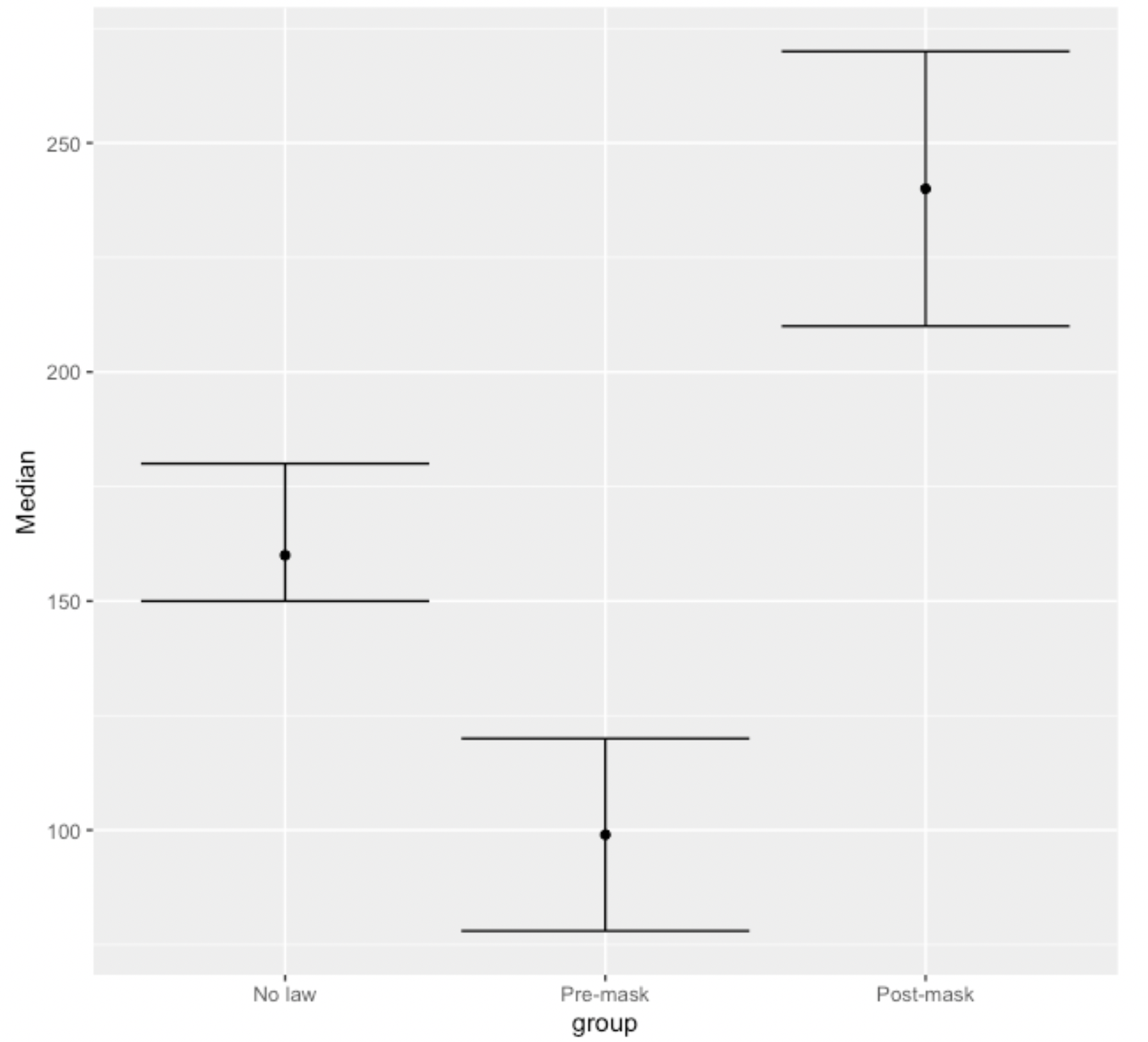
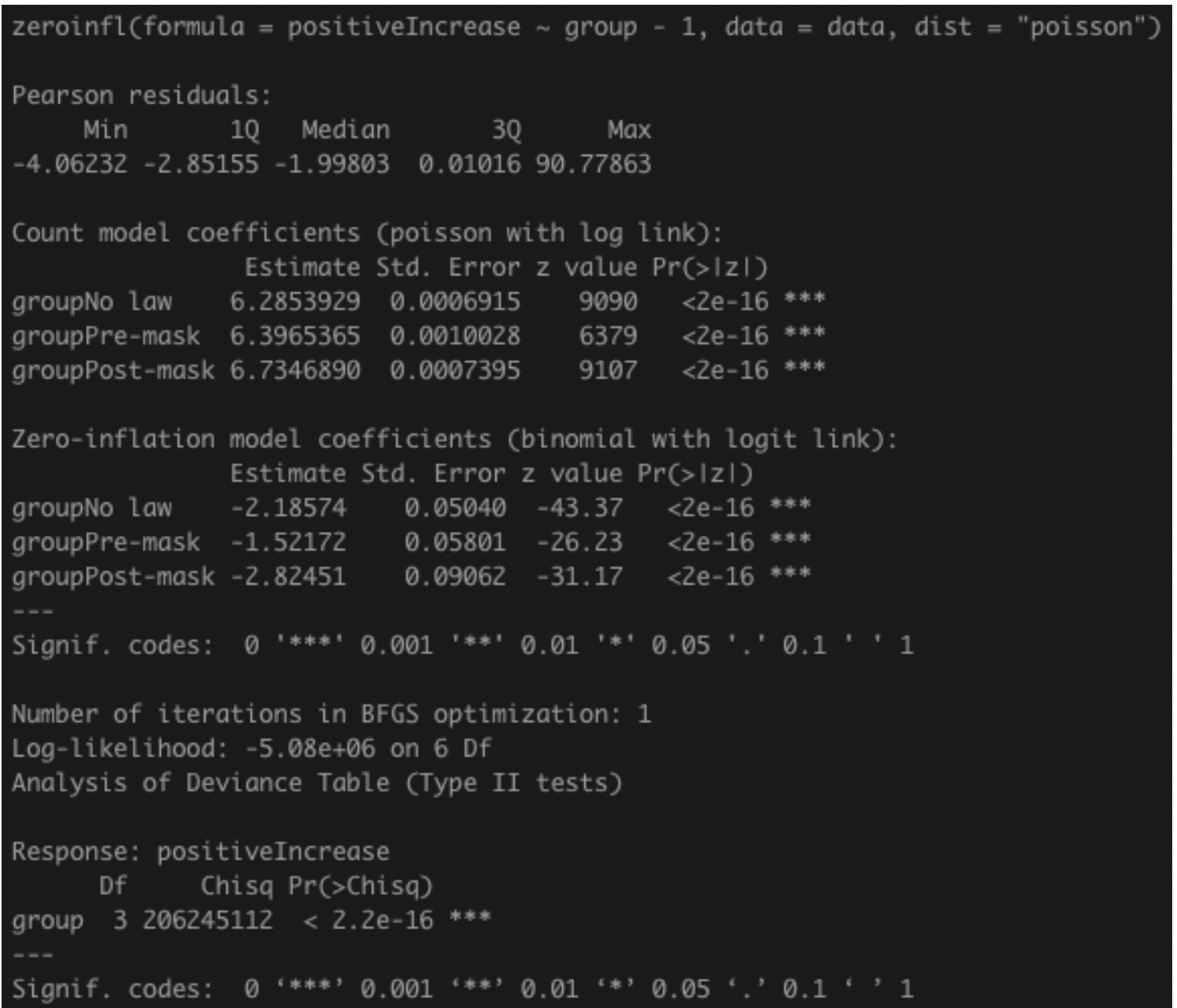
Post-hoc
test
with Tukey Adjustment

Cases
are
dependent on test numbers so looking at a few examples of positivity
rate change it can be observed the following comparing before and
after based on data reported.
California
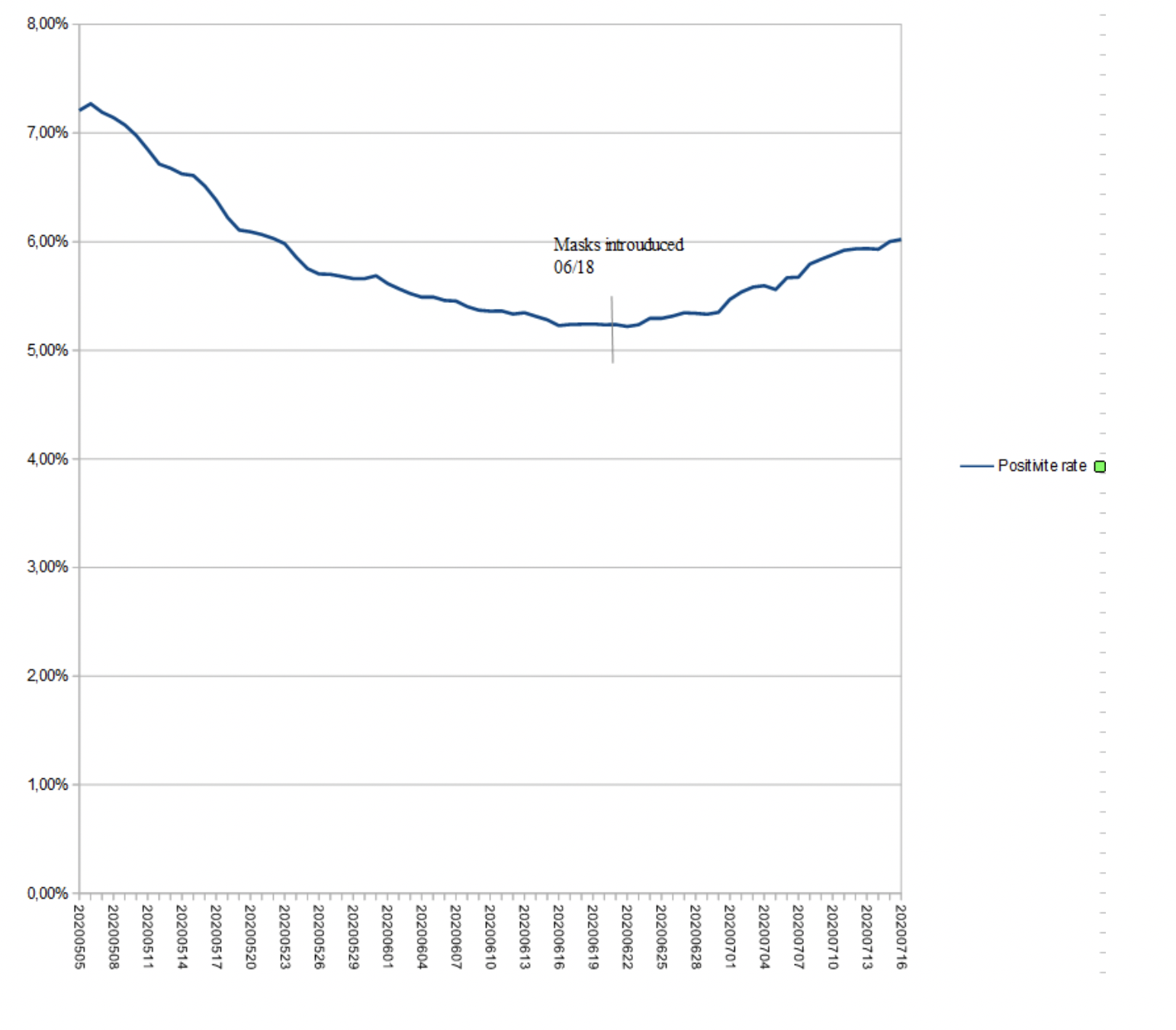
Texas
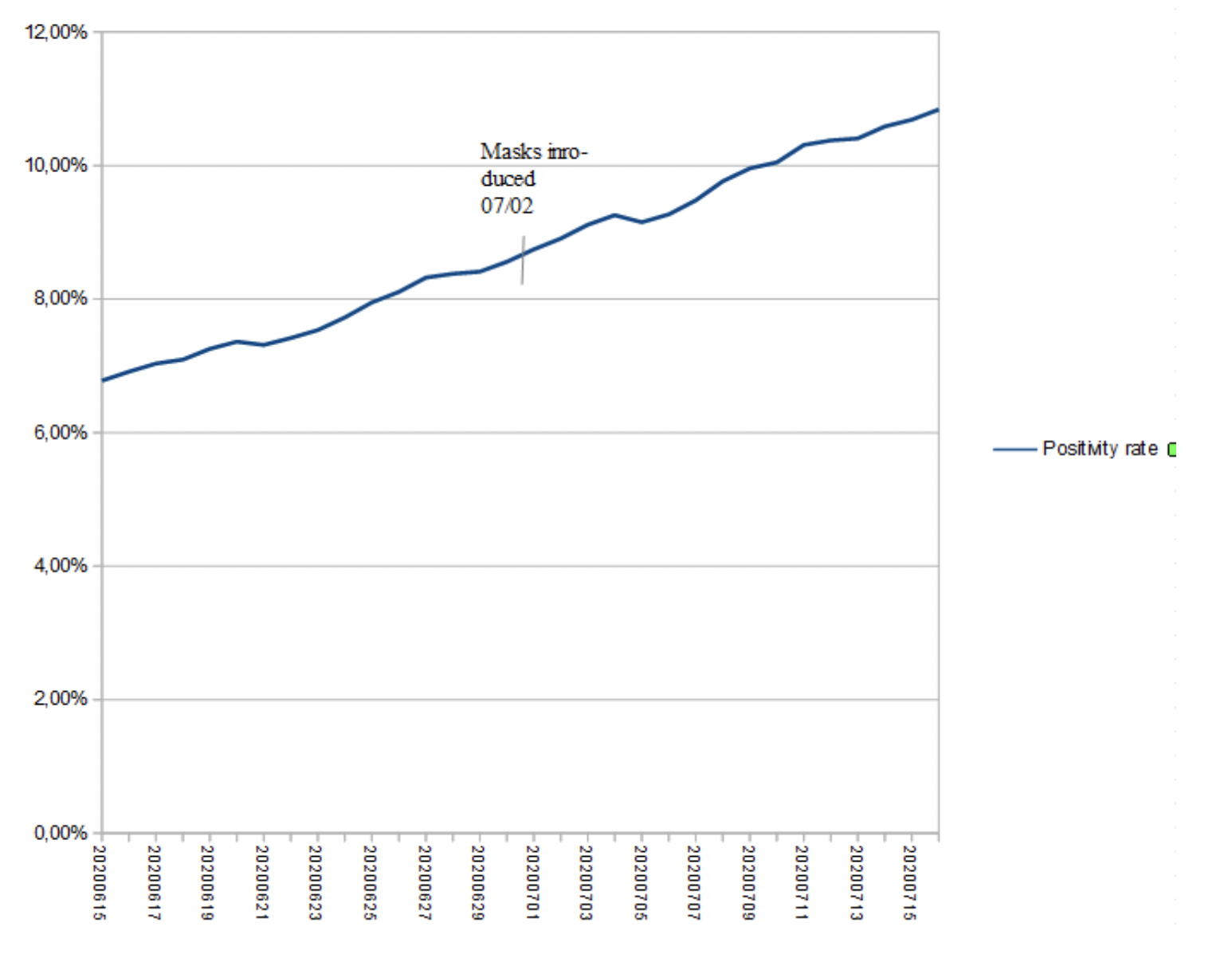
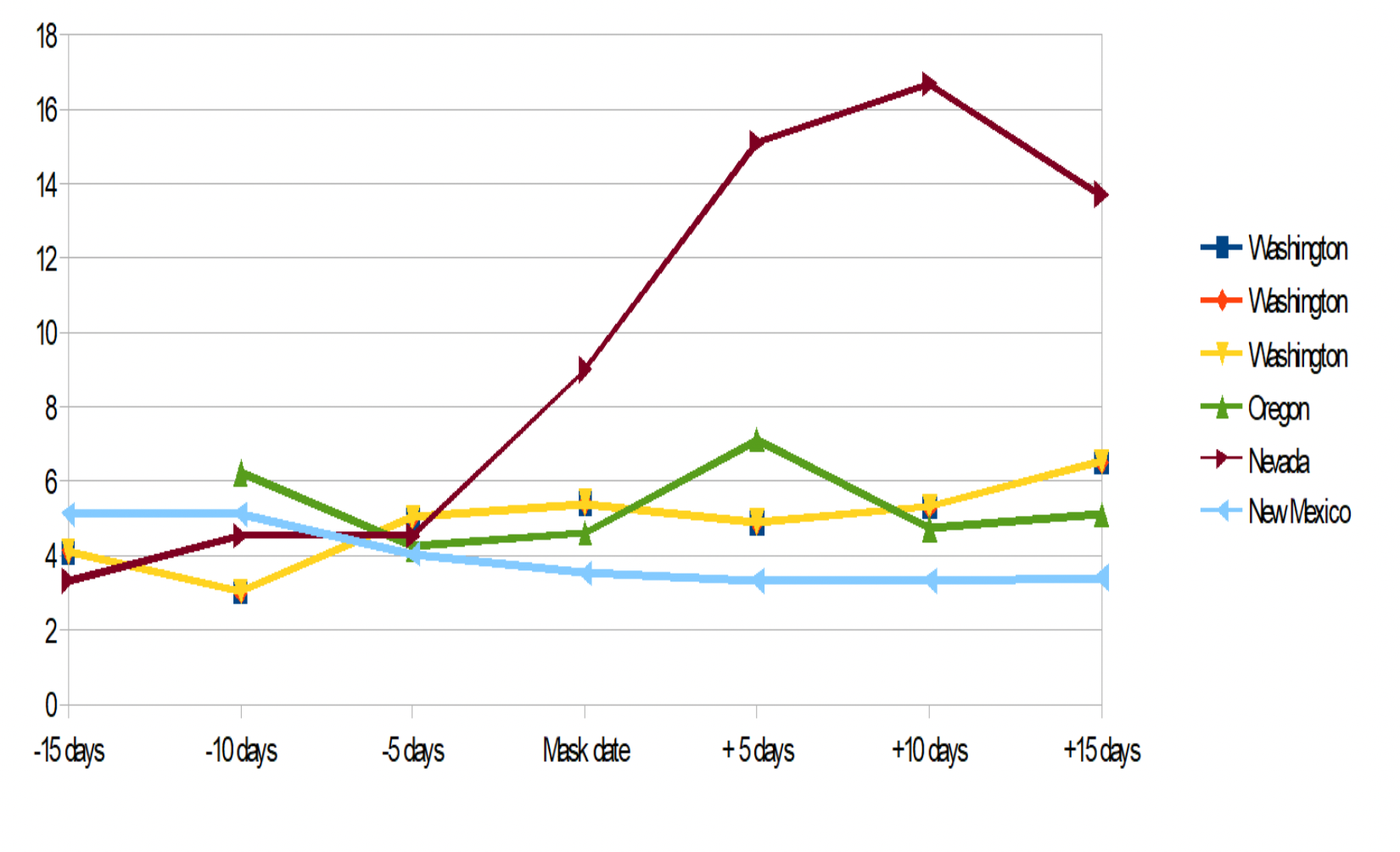
Masks enforcement has been guided by increases in cases
and modeling tecniques projecting on small sample experimentations
as well as a need for action. These findings are consistent with
similar observations that can be made in Spain and France where case
counts an positivity rates have increased significantly since laws
extending use of facemasks in Shops and open air.
These findings hint towards facemasks failing to slow
spread of contamination but may turn out to favor herd immunity as
contamination seems to increase in some regions.
This finding comes in line with long known literature
teachnig how facemasks must be used, changed, destroyed in a
clinical closed setting and risks associated with other uses.
« his study is
the first RCT of clothmasks, and the results caution against the use
of clothmasks. This is an important finding to informoccupational
health and safety. Moisture retention,reuse of cloth masks and poor
filtration may result inincreased risk of infection. Further
research is neededto inform the widespread use of cloth masks
globally. »
If goal is to pursue herd immunity, better solutions must
be found as prolonged wearing of masks outside clinical settings may
come with side effects, some of which are known and others to be
discovered. Since mandating prolonged wearing of masks as protection
or prohylaxis is a novelty, there are few studies as to harm,
immediate or long term side effects. Nor are there harm benefit
analysis as usually done for any intervention. So we can scratch the
surface by extrapolation
http://medcraveonline.com/JLPRR/JLPRR-01-00021.pdf
« The
discomfort level was increasing with time while wearing masks, with
significantly higher magnitude in S1 (p<0.001). There is an
increase of nasal resistance upon removal of N95 respirator and
surgical facemask potentially due to nasal physiological
changes. »
Some studies have been done on wearing Niqab which is not
as tight as a facemask but may give us some indications as to some
known side effects.
https://pubmed.ncbi.nlm.nih.gov/21816088/
«Very
low plasma 25(OH)D levels in females wearing Hijab or Niqab are
highly attributed to low sunlight or UVB exposure. »
« Significant
negative correlation was found between the FVC and FEV1 values and
the number of hours of the use of face veil per day. Conclusions:
Long-term use of traditional niqab use can affect VF. »
(Ventlatory function)
« Respiratory infections and asthma were
significantly more common in veils users (p < 0.00001 and p <
0.0003, respectively). This unexpected finding was probably
secondary to infection. More and bigger studies are
recommended. »
One
review
of litterature concluded
« In
conclusion there remains a substantial gap in the scientific
literature on the effectiveness of face masks to reduce transmission
of influenza virus infection. While there is some experimental
evidence that masks should be able to reduce infectiousness under
controlled conditions [7], there is less evidence on whether this
translates to effectiveness in natural settings. »
« Large
intervention
studies in healthcare and community settings are likely to provide
the best evidence of the effectiveness of face masks in reducing
transmission in pandemic and inter-pandemic periods... »
This
analysis
reports as to failure of masks to prevent spread in general
population as conditions will always bu suboptimal, could be leading
to self-contamination and side effects.